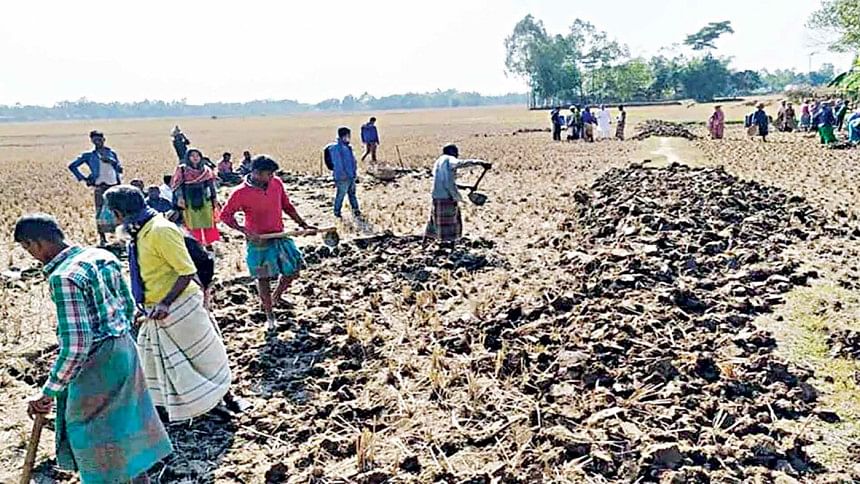Citizen participation in sustainable rural development

Meaningful citizen participation is imperative for equitable development. Since rural development is a people-oriented programme, it is essential that people should take an active part in the rural development process. As an essential pillar of democratic and public service transformation, local government is where solving the problems of democratic development has to start. One important way of strengthening democratic institutions without weakening the executive is to ensure the active participation of citizens in the rural development process by way of making the standing committee of local government functional.
Standing committee helps organisations reduce their workload and perform different functions more efficiently with the formulation of rational decisions and providing an important means of oversight on the functioning of governing bodies. For instance, Union Parishad as the lowest tier of local government institution has been working for a long time to provide services to citizens at their doorstep. It is the only institution to ensure good governance, development planning, implementation, transparency, and accountability for rural Bangladesh.
Sustainable development can be regarded as an all-encompassing and equitable standard that endeavours to provide solutions to economic, social and environmental challenges. The 2030 Agenda underscores the need for an inclusive and localised approach towards attaining Sustainable Development Goals (SDGs). The pledge to leave no one behind should be embedded at the heart of the equitable rural development approach in Bangladesh.
Bangladesh's rural economy, and specifically agriculture, has been the powerful driver of poverty reduction in Bangladesh since 2000. Investment and expansion of the rural non-farm enterprises are parallel priorities of the government. Spanning from the day-to-day life to the broader sectors of agriculture and other economic activities, Bangladesh's villages have long entered a revolutionary phase. Localising SDGs through local governance for the sake of bringing about qualitative change in the lives and livelihood of village dwellers (above 62 percent of the total population in Bangladesh) is essential.
The Covid-19 pandemic has enabled us to rethink why states should focus on improving the lives of their citizens. Community participation in the design and management of a development project greatly enhances the likelihood of project success.
By and large, standing committees are small groups of representatives who are assigned, on either a temporary or permanent basis, to examine matters more closely than the institution can. Since standing committees operate under less formal rules, their members are able to discuss issues informally and to develop relationships with colleagues who represent different interests. That creates a collegial environment in which compromises on small matters and technical improvements in overall functioning can be agreed upon expeditiously.
The latest Local Government (UP) Act 2009 has created an opportunity to ensure greater participation of people in the process of development planning and implementation. According to the UP Act, 2009, there is a provision of 13 standing committees in the UP to support the Parishad in ensuring transparency, accountability, and people's participation in planning and implementation for ensuring better governance and services. As per the UP act, each UP is supposed to form at least 13 standing committees on different issues like education, health, family planning, social welfare and disaster management, and agriculture, fisheries and livestock.
The standing committee, comprising elected representatives from the Parishad, civil society members, socially respected persons and women representatives of that locality, is entitled to assist the UP for ensuring better services and resolving different problems. For instance, the standing committee helps drive decisions and provides an important means of oversight on the functioning of governing bodies. However, these standing committee s are not active in about 80 percent of the Parishads because the elected chairmen and other members are not properly aware and interested in its functions and jurisdictions.
The reasons behind the sluggish performance of standing committees may be attributed to a number of factors such as lack of initiatives of UP members, lack of pressure from the common people, lack of political pressure, lack of skills required for planning and implementing development programmes at the local level, no specific terms of references of the standing committee, unwillingness on the part of UP Chairman to delegate authority and even existence of standing committee only on paper.
The essence of the standing committee system is still unrevealed to most of the standing committee members. Schemes recommended through standing committee meetings do not get urgency in the regular Parishad meetings.
Quorum in the standing committee meeting has come out as a strong barrier in the way of its functioning. Since participation of members has not been made obligatory by law, most members of the standing committee show their reluctance to attend meetings. Conversely, Union Disaster Management Committee headed by the Union Chairman has remained on paper as chairman and other members are not well trained about the procedures. On the other hand, reluctance on the part of the member secretary has also come out as a prominent cause for weakening the functioning of the committee.
Advocates of decentralisation argue that it opens up avenues for women to articulate their interests, to enter arenas of political decision-making, and to advance women's interests. To mainstream them into the decision-making process, the provision of the local government act of 2011 says that 17 committees are to be chaired by the two vice-chairpersons (male and female) of Upazila Parishad (UZP). It provided the structural framework for women's participation in political decision-making. It has also provided an opportunity to bring women to the centre of local development and to develop new grassroots level leadership. None of the women vice-chairs have expressed their discontent or disagreement about the decisions of the Parishads—which is indicative of the fact that women are underrepresented in the decision-making processes at all levels of governance.

LOCAL GOVERNMENT IN SUSTAINABLE RURAL DEVELOPMENT
There is growing awareness, recognition and acknowledgment by the international development community and national governments that the local sphere of government is in the best position to facilitate the mobilisation of local development stakeholders, notably the NGOs and private sector, local communities, and national and international organisations for attaining inclusive sustainable development within their respective localities. Participatory grassroots local government is indispensable for delivering on the SDGs, particularly in poor and marginalised areas. Local government not only ensures access to basic services but provides an effective platform for the poor, peasants, workers and women to participate in the decision making and development process that are undertaken for them. Strengthening local government in rural Bangladesh is perhaps the only viable solution for the government to translate policies into inclusive development and increased prosperity. The endeavour of the Bangladesh government toward the "localisation" of global agendas is progressively expanding to the grassroots level.
On the face of it, people living in rural Bangladesh are more or less affected by contingencies like unemployment, employment injury, sickness, disability, widowhood, old age, death of the principal bread earner of the family and natural disasters. To ensure women's equal access and increased participation in political power structures, the Local Government (Union Parishad) Second Amendment Act 1997 of Bangladesh can be seen as a great milestone.
Natural disasters like floods, cyclones, and famine cause many deaths and lead to poverty, unemployment, disease, etc. The agricultural sector is not sufficient to generate full-time employment opportunities for people in rural Bangladesh. Moreover, disease, disabilities and vulnerabilities of children, women, and aged population have been major causes of concern in rural Bangladesh.
Union Parishad has a few programmes like food for work, old-age allowance, vulnerable group development, and so on, that generate opportunities for the poor, disabled, and vulnerable sections to manage their minimum living requirements. UP also assists old people, widows, divorced women, and disabled freedom fighters by providing fixed benefits.
To bridge the gap between informal and formal dispute resolution, Bangladesh redesigned Shalish through the 2006 Village Courts Act. The village courts aim to combine the best of Shalish on the one hand (accessibility and effectiveness), and of the formal judicial system on the other (procedural justice). The 2006 act provided for the establishment of a village court in every UP. Informal dispute resolution through village courts has great potential, but marginal and poorer sections of society continue to suffer from lack of access to informal justice. Women, in particular, are struggling to get their voices heard.
Health security for rural people is undermined by the lack of physicians, employees and nurses, misdiagnosis, negligence towards patients, irresponsibility, absenteeism and a lack of professional ethics. Doctors are deterred from serving in villages due to the absence of proper capacity development, accommodation, quality education, transportation facilities, and lack of career prospects. UP also struggles to push for improvements due to the scarcity of resources and dynamic leadership. The government of Bangladesh has taken several significant steps during the last decades to build up institutional arrangements from national to the union levels for effective and systematic disaster management.
Recognising the fundamental job of local government in the realisation of sustainable development will empower us to mobilise local stakeholders and to build new partnerships. Local governments must have the means and the capacity to improve administration, envision demands, and plan and implement solutions.
"Effective, accountable and transparent institutions" and "responsive, inclusive, participatory and representative decision-making at all levels" require a clear institutional framework, reinforced management and planning capacities, participatory mechanisms and regular financial negotiations between all levels of government and local communities to define priorities and plan of action. Political will must continue to be upheld and the spirit of unbiased participation irrespective of gender and people with disabilities to the sustainable development process under the auspicious of local government must be preserved. Sharing of power can help empower women. Changing society's mindset is also important in this regard.
We must remember that a critical challenge encountered in the early implementation of the MDGs as opposed to the SDGs was the initial lack of grassroots consultation and support and, most importantly, community ownership. Therefore, empowering local government has now become imperative.
Dr Mohammad Tarikul Islam is an Associate Professor of Government and Politics at Jahangirnagar University. He has been a Visiting Scholar at the University of Oxford, the University of Cambridge and SOAS (University of London). Email: [email protected]

 For all latest news, follow The Daily Star's Google News channel.
For all latest news, follow The Daily Star's Google News channel. 



Comments